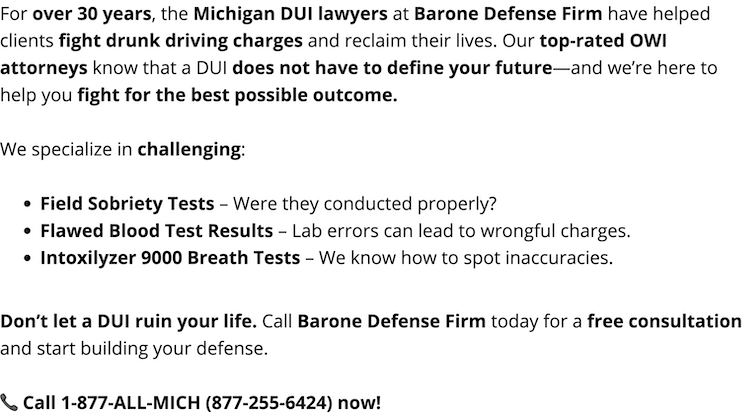Felony Drunk Driving Penalties
Michigan has adopted sentencing guidelines that apply to all felony cases including felony drunk driving. In Michigan, felony drunk driving with injury or death is a "crime against the person" and a class "C" felony, and is punishable by up to 15 years. There is no minimum sentence for these more serious drunk driving offenses.
Michigan's other felony drunk driving laws[i] require that an individual convicted of a violation after two prior convictions that is sentenced to a probationary term must be also sentenced to no less than 30 days in the county jail, with 48 hours being served consecutively.
This would be considered a "standard" felony drunk driving in Michigan, which is a "crime against public safety" and a class "E" felony.[ii] This is the category and class that will apply to all third offense drunk driving cases in Michigan.
When Does a DUI Become a Felony in Michigan?
Most first and second drunk driving convictions in Michigan are misdemeanors. However, several circumstances can elevate a DUI to a felony offense. A DUI, or OWI as it's called in Michigan, can be a felony if:
- It's the third OWI during your lifetime
- It's an OWI involving bodily injury or death
- It's an OWI with a child passenger
- You've had a prior felony motor vehicle conviction
Michigan considers lifetime DUI records when deciding whether to pursue felony charges. Even if your first and second offenses occurred decades ago, a third charge still qualifies as a felony DUI under state law. These charges trigger more than embarrassment and points against your license — a felony offense opens the door to harsh long-term penalties and lifelong consequences.
Felony Drunk Driving Penalties in Michigan
The severe penalties for a felony DWI go far beyond the consequences for a misdemeanor OWI. Depending on your case, you could face jail time or a prison sentence of up to 15 years in cases involving injury or death. The fines for DUI charges can total up to $5,000, and you can have your license suspended for extended periods — or even permanently — with no option to get a restricted license. In many cases, you must install an interlock device on your ignition before the state reinstates your driving privileges. The state may also require you to enroll in a mandatory alcohol treatment program and can sometimes immobilize or even take your vehicle after conviction.
Sentencing Range
In most instances, felony drunk drivers who have not injured or killed anyone will have sentence guideline ranges of either 0-6 or 0-9. Certain things, like prior criminal offenses of any kind, and very high breath or blood test results, will increase the guidelines. The same is true of "habitual offenders," that is, those who have more than one felony conviction of any kind.
Bear in mind that the Michigan drunk driving law requires a minimum sentence of 1-5 years, with the first 30 days served behind bars, at least 48 hours of which must be consecutive. So, even though the guidelines say, for example, 0-6, you must still serve at least 30 days in jail.
If you are facing a felony drunk driving charge then it is best to hire an experienced lawyer who can help you obtain the best possible sentence. At the Barone Defense Firm we have handled hundreds of felony cases, and typically handle 20-30 per felony drunk driving cases each year.
Sentencing Guidelines Addendum
As indicated in the sentencing manual itself: [I]n general, the statutory sentencing guidelines apply only to felony offenses for which the penalty prescribed is an indeterminate sentence, and the sentencing court retains discretion in imposing an offender's sentence. That is, the guidelines are not applicable to offenses for which the applicable statute establishes a mandatory determinate penalty or a mandatory penalty of life imprisonment for conviction of the offense. [iii] Consequently, the sentencing guidelines will only apply to Michigan felony drunk driving.
Additionally, the statutory sentencing guidelines apply to listed felony offenses[iv] that were committed on or after January 1, 1999.[v] The statutory sections listing the felony offenses to which the guidelines apply contain brief descriptions of the felonies listed there "for assistance only."[vi] The language contained in the statute defining the felony offense itself governs application of the sentencing guidelines.[vii] The statutory sentencing guidelines in effect on the date the offense was committed govern the calculation of an offender's minimum sentence.[viii]
When an offender is convicted of multiple offenses, a sentencing information report (SIR) should be completed for the sentencing offense that has the highest crime class. In instances where the sentences imposed will be served consecutively, an SIR should be completed for every crime that will be served consecutively.
Our Approach to Felony DUI Defense in MI
Barone Defense Firm takes a personalized approach to felony DUI charges in Michigan. We investigate every aspect of your case, including identifying errors with field sobriety tests, blood tests, and breath tests. We also look for errors, violations, and inconsistencies with law enforcement reporting, eyewitness statements, and other documentation that could work in your favor.
We first evaluate the legality of the traffic stop, such as whether the police had probable cause, and in many cases, we can suppress key evidence. In some instances, we negotiate for reduced charges or alternative sentencing, including alcohol treatment programs and participation in sobriety courts. In others, we fight for a full dismissal at trial.
Why Choose Barone Defense Firm for Felony DUI Defense?
Experience matters when your freedom is on the line. No matter the charges you face, Barone Defense Firm focuses on one thing — protecting your future. Our decades of experience and reputation for providing top-notch criminal defense representation in complex DUI cases make us your go-to call when facing felony OWI charges in MI.
You can feel confident you're in good hands when our team of dedicated criminal defense lawyers is in your corner. We keep you informed throughout the process, explain your options, and help you make the best decisions for your unique situation. Our client-centered strategic approach focuses on outcomes, so we offer support, clarity, and skilled legal guidance when you need it most.
Michigan DUI Attorney Near You
Barone Defense Firm has your back in felony DUI cases. The areas we service in Michigan include:
- Farmington Hills
- Grand Haven
- Ann Arbor
- Plymouth
- Hudsonville
- Rochester
- Grand Rapids
- Troy
- Birmingham
- Holland
- Bloomfield Hills
- Novi
We offer flexible consultations, so you can speak with an attorney as soon as possible when you're concerned about license suspension or revocation — or how a felony offense might affect your future. We answer all your questions and walk you through your options. Remember, the sooner you reach out, the more opportunities Barone Defense Firm has to protect your rights and your future.
[i] MCLA § 257.625(9)(c)(ii)
[ii] 2009 Michigan felony list by statute number
[iii] MCL 769.34(5).
[iv] MCL 777.11 to 777.19
[v] MCL 769.34(2).
[vi] MCL 777.6; MCL 777.11 to 777.19
[vii] MCL 777.6.
[viii] MCL 769.34(2).
 Barone Defense Firm Home
Barone Defense Firm Home




















